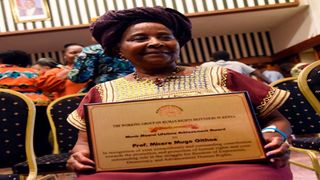
Prof Micere Mugo Githoe receives the Munir Mazrui 2022 Lifetime Award at Kenya National Theatre on January 6, 2023. Micere, a celebrated writer and poet, received the award from Defenders Coalition for her contribution towards the promotion of human rights.
News
Premium
Henry Indangasi: No, Micere Mugo was not a deep thinker
What you need to know:
- If I’m crucified for saying what I am about to say, so be it.
- In all her writings, she assumed that literature was almost exclusively about politics.
A lot has been said and written about Prof Micere Mugo. Much of it is false and factually untrue. As her former colleague in the Department of Literature at the University of Nairobi, I feel called upon to set the record straight.
I remember her as a warm and friendly person. She was the kind of person who would buy you a big lunch in the Senior Common Room without counting the cost.
She was a good teacher, the type who carefully prepared and thought through her lecture notes.
And no, she wasn’t the type to miss an appointment with a student she was supervising.
In 1980, she controversially vied for the deanship of the Faculty of Arts.
The issue wasn’t that she was a woman: the issue was that she was technically not qualified. The rule was that to qualify for a deanship, you had to be an associate professor or a senior lecturer who had been a chair of a department.
Micere Mugo was a senior lecturer but she had never been the head of the Department of Literature. She won the election, and the then-Vice Chancellor Prof Joseph Mungai, under pressure, bent that rule and allowed her to head the Faculty of Arts.
Let me state at the onset that part of the problem in understanding Micere Mugo’s ideological positions lies in the difficulty of drawing the line that separates the personal from the political, or if you like, the private from the public.
In her case, the line gets really blurred, especially when we try to speculate on the motivation of her activism.
I am saying this because, before she became dean, she had gone through a messy and acrimonious divorce.
This was especially awkward because her husband was a lecturer at the Faculty of Science at Chiromo Campus.
At some point, she was admitted to Nairobi Hospital with severe depression. The university granted her a six-month sick leave.
The rule was that if you did not recover after the six months, you were retired on medical grounds. But in her case, when she didn’t recover, she was granted another six-month sick leave to allow her to seek further treatment in the United States.
Micere had left a worker to sit her university house when she went to the US. At the end of the six months, the Housing Department wrote to her inquiring whether she would return to her official residence, or if the house could be allocated to another lecturer.
Her response was a long and rambling tirade addressed to the VC, accusing the institution of colluding with the pro-imperialist Daniel arap Moi government in suppressing workers and peasants. In short, she was saying she wasn’t coming back.
Remember in addition to her privileged background, Micere had the kind of connections that, to many of us, were the stuff that dreams are made of.
Her brother-in-law Jeremiah Kireini was the boss of the public service and secretary to the Cabinet of President Moi, while her sister, Mrs Kireini, was the country’s chief nurse.
Those who say she was forced into exile are engaged in ignorant political guesswork.
Let me turn to her stay in Zimbabwe. In 1978, Robert Mugabe and his Zanu colleagues came to Nairobi to meet the OAU foreign ministers and to plead for support for their liberation movement.
The story had it that they wanted money to buy blankets and medicines for their guerrillas. On the sidelines, Mugabe asked to meet the so-called progressive academics from the University of Nairobi.
I joined the group. Micere was part of the group. The meeting took place at the Intercontinental Hotel. Kenyans sat on one side of rectangular tables joined together, and the Zimbabweans on the other.
I sat right opposite Mugabe because I wanted to ask him about the quarrel between Zanu and Joshua Nkomo’s Zapu. In answer to my question, he said dismissively: “Zapu are getting heavy weaponry from the Soviet Union, but they are not doing any fighting.”
I could see he was not interested in any serious ideological debate. In the meantime, he was smiling at somebody on our side of the table, who turned out to be Micere.
“I want that beautiful lady to come and sit next to me,” he said rather sheepishly. Looking coy and girlish, Micere walked towards him and sat right next to the future president of Zimbabwe. Mugabe then asked us to order for lunch of our choice. I was hungry, but at the same time thinking: “these guys have come for blankets and medicines for their fighters, and it is winter down there. How can they afford to buy lunch for all of us, and in a five-star hotel?’
In my naïveté, I asked for a snack, while everybody else asked for a regular lunch. Mugabe looked at me and asked, “You’re not hungry?” “No, sir, I’m not,” I lied.
The impression I formed of Mugabe, and one which I will take to my grave, was that of a vain, arrogant and egotistical leader. Years later, it didn’t shock me that he wanted the world to believe he had single-handedly liberated Zimbabwe and that he should rule that country forever.
Zimbabwe gained independence in 1980, with Mugabe as prime minister and later as president. I have every reason to believe Micere and the Zimbabwean leader kept in touch, because years later, we were told the Kenyan academic had moved to the southern African country.
The next thing we heard was that the president had offered her a top job in the Ministry of Education as the one in charge of curriculum development. But this offer was conditional: she had to renounce her Kenyan citizenship and become a Zimbabwean.
In those days, our constitution did not allow for dual citizenship.
You can see where I am going with this. Those who have claimed that the Moi administration robbed Micere of her citizenship clearly do not know what they are talking about and are too lazy to research.
I remember though that when the professor launched her collection of essays titled Writing and Speaking from the Heart of My Mind at the University of Nairobi in 2012, she spun the narrative, making it appear like the man who gave her brother-in-law a dream job was the same one who took away her passport.
According to Heidi Holland in her book Dinner with Mugabe: The Untold Story of a Freedom Fighter Who Became a Tyrant, the Zimbabwean president had been having an extra-marital affair with his secretary, Grace.
Grace, a married woman, had given Mugabe two children by the time his Ghanaian wife Sally died of kidney failure in 1992.
Unlike Sally who had brought out the softer side of Robert Mugabe, Grace reinforced the demonic impulses in the president. What is more important for our purposes is that this second wife had no time for other women in Mugabe’s orbit.
When I met Micere at the African Studies Conference in Seattle, Washington State, towards the end of 1992, she was teaching at Syracuse University, but this time as a Zimbabwean.
I had gone to the University of Iowa for my sabbatical leave under the sponsorship of the Fulbright Foundation.
I joined the University of Nairobi’s Department of Literature in 1977. I had been out of the country for about three years, and so was trying to find my bearing.
One day, I went to the Norfolk for lunch. Alice Baraza, who would go on to be appointed Managing Director of the Jomo Kenyatta Foundation, walked in and joined me at my table.
“I’m told you’re the new member of the liberation movement,” she said as she sat.
“What do you mean?” I asked, innocently.
“So you don’t know? The Department of Literature calls itself a liberation movement,” she answered with a tinge of irony.
Actually, I was hearing this for the first time. Later, I would learn about the two camps in the Department: those who were pro-Micere Mugo and those who were pro-Ngugi wa Thiongó.
The two protagonists had co-authored The Trial of Dedan Kimathi, so the issue was not who was a better playwright or who was a more accomplished literary scholar, rather, who, between the two was more progressive or revolutionary.
The older colleagues leaned towards Ngugi wa Thiongó, while the younger ones gravitated towards Micere.
I would often bump into young men (it was always young men, some wearing dreadlocks) who would say they were going to Micere’s house to discuss revolutionary politics. The discussions, I was told, would stretch into the middle of the night.
And I would wonder, do these young people have any respect for the privacy and sanctity of marriage?
Besides, from an intellectual angle, these fellows did not give me the impression they had the comprehension skills to go through the three thick volumes of Karl Marx’s Das Capital, nor did they look like they had the literary competence to read and understand the four volumes of Mikhail Sholokhov’s novel And Quiet Flows the Don.
If I’m crucified for saying what I am about to say as I conclude this biographical sketch, so be it: Micere Mugo was not a deep thinker. In all her writings, she assumed that literature was almost exclusively about politics.
No, dear reader. Literature, as an institution, is about the totality of human experience. She was an essentially good human being who allowed herself to be derailed by a shallow, mindless activism, masquerading as a revolutionary ethos.
Long after the end of the Cold War, the esteemed professor was still harping on the spurious dichotomy between the anti-imperialist and the pro-imperialist intellectuals in Kenya.
- Henry Indangasi is a Professor Emeritus, Department of Literature, University of Nairobi




